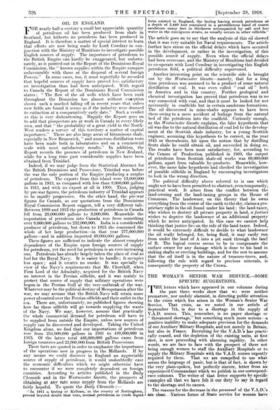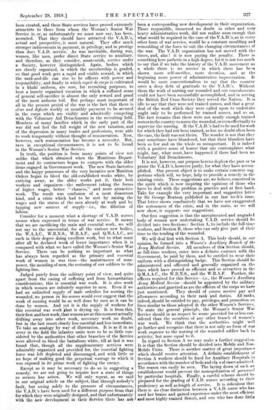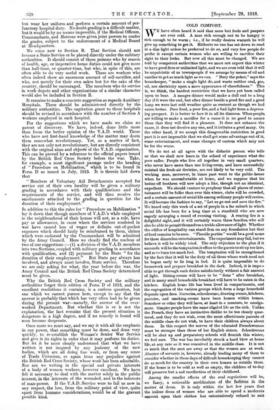THE WOMAN'S SENIOR WAR SERVICE.—SOME SPECIFIC SUGGESTIONS. T HE letters which
have appeared in our columns during the past three weeks show that we were neither premature, nor unduly alarmist, in directing public attention to the crisis which has arisen in the Woman's Senior War Service. That crisis, as we noted in our article of Septeniber 7th, is due to a shortage in the supply of V.A.D. nurses. This, remember, is no paper shortage or " threatened shortage," but something much more serious—a positive inability to make adequate provision for the demands of orur Auxiliary Military Hospitals, and not merely in Britain, but also in France. Recruiting for the V.A.D.'s has practi- cally ceased, and the depletion of the existing units, at first slow, is now proceeding with alarming rapidity. In other words, we are face to face with the prospect of there not being enough women to staff the Auxiliary Hospitals or to supply the Military Hospitals with the V.A.D. nurses urgently required by them. That we are compelled to use what seems the language of panic, but is that of fact, is shown by the very plain-spoken, but perfectly sincere, letter from an experienced Commandant which we publish in our correspond- ence columns. The writer of that letter supports by specific examples all that we have felt it our duty to say in regard to the shortage and its causes.
The reasons for the decrease in the personnel of the V.A.D.'s age Chat Various forms of State service for women have been created, and these State services have proved extremely attractive to those 'from whom the Woman's Senior War Service is, or, as unfortunately we must now say, has been, recruited. That they should have attracted the V.A.D.'s, actual and prospective, is most natural. They offer much stronger inducements in payment, in privilege, and in prestige than does V.A.D. service. As was inevitable, during war, women, like men, prefer direct State service to auxiliary, and therefore, as they consider, amateurish, service under a Society, however distinguished. Again, bodies which are closely organized, in which the membership is graded, so that good work gets a rapid and visible reward, in which the rank-and-file can rise to be officers with power and responsibility, and finally in which esprit de corps is cultivated in a khaki uniform, are sure, for recruiting purposes, to beat a loosely organized vocation in which a suffused sense of general self-sacrifice is almost the only reward and proof of the most arduous toil. But perhaps most important of all in the present period of the war is the fact that there is clear and definite weekly or monthly payment to be secured in the corps which are visibly and admittedly competing with the Voluntary Aid Detachments in the recruiting field. Members of many families which in the early part of the war did not feel the full weight of the new taxation, and of the depression in many trades and professions, were able to work temporarily without thought of remuneration. Now, however, such remuneration has become a necessity. But, save in exceptional circumstances, it is not to be found in the Woman's Senior War Service.
In truth, the position is from many points of view not unlike that which obtained when the Munitions Depart- ment and its contractors began to compete with the older firms engaged in Government work. The new State factories and the happy possessors of the very lucrative new Munition Orders began to bleed the old-established works white, by enticing away, as the older works put it, their best workers and organizers—the enticement taking the forms of higher wages, better " chances," and more attractive work. The result was confusion of a most disastrous kind, and a crisis which had to be met by raising the wages and the status of the men already at work and by tapping new sources of supply—i.e., the dilution of labour.
Consider for a moment what a shortage of V.A.D. nurses means when expressed in terms of war service. It means that we are sacrificing the main and essential work, we will not say to the unessential, for all the various new bodies, the W.A.A.C., W.R.N.S., W.R.A.F., and Q.M.A.A.C., are each in their degree doing excellent work, but to what must after all be declared work of lesser importance when it is compared with what we have called the Woman's Senior War Service. There can be nothing so important as what has always been regarded as the primary and essential work of women in war time—the maintenance of man- power, the mending of men, the restoring of our soldiers to the fighting-line.
Judged purely from the military point of view, and quite apart from the easing of suffering and from humanitarian considerations, this is essential war work. It is also work in which women are infinitely superior to men. Even if we had an unlimited supply of male orderlies for nursing the wounded, no person in his senses would ever suggest that the work of nursing would be as well done by men as it can be done by women. And yet it is the supply of workers for this essential war work that is drying up. It is from this, their first and best work , that women are at this moment actually drifting away into other work, necessary work no doubt, but in the last resort clearly less essential and less immediate. To take an analogy by way of illustration. It is as if in an army in the field the infantry units were to be so little con- sidered by the authorities that other branches of the Service were allowed to bleed the battalions white, till at last it was found that, though all the supplementary services were admirably organized and provided for, the essential fighting force was left depleted and discouraged, and with little or no hope of making good the, perpetual wastage to which it was exposed in its prime work of fighting the enemy.
Except as it may be necessary to do so in suggesting a remedy, we are not going to inquire how a state of things so serious has arisen. We will only repeat, as we said in our original article on the subject, that through nobody's fault, but owing solely to the pressure of circumstances, the V.A.D.'s have been used for a different purpose from that for which they were originally designed, and that unfortunately with the new development in their Service, there has not been a corresponding new development in their organization. Those responsible, immersed no doubt in other and very heavy administrative work, did not realize soon enough that what would be required in the case of the V.A.D.'s,as in every other form of war service, would be a constant moulding and remoulding of the force to'suit the changing circumstances of the war. The V.A.D. organization has not moved with the times, and, alas ! it is now paying the penalty. There is something here pathetic in a high degree, for it is not too much to say that if we take the history of the V.A.D. movement as a whole there h no service in which there has be sn shown more self-sacrifice, more devotion, and at the beginning more power of administrative improvisation. It would be mere conventionalism to say that the country owes a deep debt of gratitude to the V.A.D.'s. Without them the work of nursing our wounded and our convalescents could not have been successfully accomplished, and in serving the British Red Cross Society they served the Nation. It is idle to say that they were not trained nurses, and that a great deal of the work which they were called upon to undertake ought only to be performed by trained nurses, and so on. The fact remains that there were not nearly enough trained nurses in the country to nurse the wounded, or even effectually to supervise the nursing. If the V.A.D.'s had to be used for work for which they had not been trained, as has no doubt often been the case, the fault was not theirs. The wonder is not that they may sometimes have blundered, but that their blunders have been so few and on the whole so unimportant. It is indeed with a positive sense of horror that one contemplates what might, nay, what must, have happened if there had been no Voluntary Aid Detachments.
It is not, however, our purpose here to deplore the past or to praise the V.A.D.'s, however justly, for what they have accom- plished. Our present object is to make certain concrete sug- gestions which will, we hope, help to provide a remedy in the existing crisis. These suggestions are, we believe, conceived in the spirit which is now inspiring the opinions of those who have to deal with the problem in practice and at first hand. Take for example the very important and suggestive letter by Sir George Beatson published in our last week's issue. That letter shows conclusively that we have not exaggerated the seriousness of the crisis, and in the main, as we will now show, it supports our suggestions.
Our first suggestion is that the unregimented and ungraded body of women now undertaking V.A.D. service should he divided into two Sections: Section A, to include the full-time workers, and Section B, those who can only give part of their time to the tending of the wounded.
We will deal first with Section A. This body should, in our opinion, be formed into a Women's Auxiliary Branch of the Army Medical Service. All members of this Section should, as full-time workers, enter into a definite contract with the Government, be paid by them, and be entitled to wear their uniform with a distinguishing badge. This Section should be administered and officered and generally organized on the lines which have proved so efficient and so attractive in the Q.M.A.A.C., the W.R.N.S., and the W.R.A.F. Further, the officers required for this Service—i.e., the Women's Auxiliary Army Medical Service—should be appointed by the military authorities and gazetted as are the officers of the corps we have just mentioned. They should of course receive pay and allowances according to their rank and duties. All ranks, indeed, should be entitled to pay, privileges, and promotion on lines similar to those adopted in the other Women's Services. To state the general principle, the Woman's Senior War Service should in no respect be worse provided for or less con- sidered than the members of any other branch of women's war work. We think that the authorities might well go further and recognize that there is not only no form of war work superior to the nursing of the wounded soldier back to activity, 'but none equal to it. In regard to Section A we may make a further suggestion. It is that the Section should be divided into Mobile and Non- Mobile Units. There is another matter of great importance which should receive attention. A definite establishment of Section A workers should be fixed for Auxiliary Hospitals in accordance with the number of beds and cla-s of cases admitted. The reason can easily be seen. The laying down of such an establishment would prevent the monopolization of personnel by particular hospitals. Finally, a careful scheme should be prepared for the grading of V.A.D. nurses according to their proficiency as well as length of service. It is ridiculous that there is no clear distinction between a V.A.D. nurse who has used her 'brains and gained experience under the most efficient and most highly trained Sisters, and one who has done littLs but wear her uniform and perform a certain amount of per- functory hospital duty. No doubt grading is a difficult matter, but it would be by no means impossible, if the Medical Officers, Commandants, and Matrons were given joint powers to confer the grades, subject to the endorsement of a Medical Board at Headquarters.
We come now to Section B. That Section. should not become a State Service or be placed directly under the military authorities. It should consist of those persons who by reason of health, age, or imperative home duties could not give more than half-time, or quarter-time, but who, in spite of this, are often able to do very useful work. These are workers who often indeed show an enormous amount of self-sacrifiee, and who, not merely for their own sakes but for the sake of the country, should be encouraged. The members who do service m work depots and other organizations of a similar character would also be included in Section B.
It remains to make a concrete suggestion as regards Auxiliary Hospitals. These should be administered directly by the military authorities. The capitation grant to these hospitals should be revised in accordance with the number of Section A workers employed in each hospital.
For the suggestions which we have made we claim no patent of discovery. We have, indeed, done little more than focus the better opinion of the V.A.D. world. Those who have not first-hand knowledge of the matter may deem them somewhat revolutionary. Yet, as a matter of fact, they are not only not revolutionary, but are directly consistent with the original aims and objects of the V.A.D. organization. This can be proved by a reference to the official papers issued by the British Red Cross Society before the war. Take, for example, a most significant passage under the heading of " Procedure on Mobilization,' which is to be found in Form D as issued in July, 1913. It is therein laid down that " Members of Voluntary Aid Detachments accepted for service out of their own locality will be given a military grading in accordance with their qualifications and the • requirements of the service, and will then receive the emoluments attached to the grading in question for the duration of their employment.'
In addition to this the rules for " Procedure on Mobilization " lay it down that though members of V.A.D.'s while employed in the neighbourhood of their homes will not, as a rule, have pay or allowances, in cases where the services rendered in war have caused loss of wages or definite out-of-pocket expenses which should fairly be reimbursed to them, claims which were endorsed by the Commandant will be admitted by the Army Council. Here we clearly find the nucleus of two of our suggestions :—(1) a division of the V.A.D. members into two Sections, coupled with military grading-in accordance with qualification, and (2) payment by the State " for the duration of their employment." But State pay always has involved, and always must involve, State service. Therefore we are only asking for what, the year before the war, the Army Council and the British Red Cross Society determined must be given.
Why the British Red Cross Society and the military authorities forgot their, edition of Form D of 1913, and the excellent resolutions it contains, is a curious question, but one which we cannot pursue here, except to say that the answer is probably that which has very often had to be given during the present war—namely, the answer of the over- worked Department. But whether this is or is not the explanation, the fact remains that the present situation is dangerous in a high degree, and if no remedy is found will soon become desperate.
Once more we must say, and we say it with all the emphasis in our power, that something must be done, and done very quickly, to re-establish the Woman's Senior War Service and give it its rights in order that it may perform its duties. But let it be most clearly understood that what we have written is not inspired by any jealousy of the new bodies, which are all doing fine work, or from any sense of Trade Unionism, or again from any prejudice against the British Red Cross Society, whose work has been admirable. Nor are we writing in the special and private interests of a body of women workers, however excellent. We have felt it necessary to deal with the matter solely in the public interest, in the interests of the wounded, and in the interests of man-power. If the V.A.D. Service were to fail us now in any respect, the loss, from the military point of view, quite apart from humane considerations, would be of the gravest possible kind.




























 Previous page
Previous page